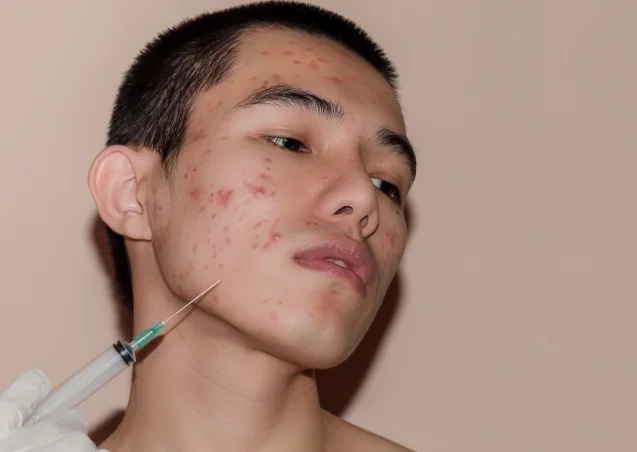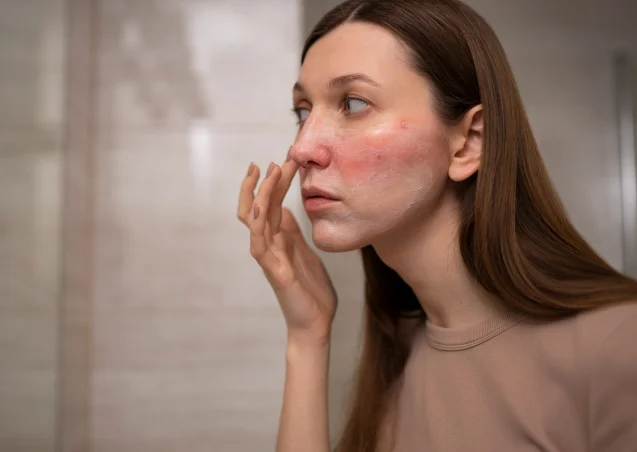
Acne scars are the result of inflammation. When acne clears, your body starts healing the skin where you had the breakout. Sometimes, the skin heals in 7 to 10 days without leaving a sign.
Acne scars are more likely to develop with acne that went deep into your skin, like a deep and painful pimple, such as an acne cyst or nodule. These types of acne cause intense inflammation in the skin, which can cause scarring. In general, the deeper the acne goes into your skin, the more likely it is to cause a scar. The skin's response is to repair the scar by forming new collagen fibers.
You may be able to reduce your risk of developing acne scars if you:

You're more likely to develop acne scars if you:
When an acne scar first appears, you may see a depression (indent in your skin) or a raised scar, along with some discoloration. Over time, the discoloration usually goes away. However, the scar remains.
If you have acne scarring, you're likely to have more than one of the following types. Each of these can be treated with varying degrees of success.
These lesions of scar tissue rise off the skin. They're caused when fibrous tissues, the collagen, in the region of the skin overgrow. These scars are usually found on the chest, back and shoulders and jaw line and can be itchy, tender or painful.
Treatment for Depressed (Sunk-in) Acne Scars : These scars may be treated with a procedure, acne scar surgery, or medication applied to the skin. To give you the best results, your dermatologist may use more than one treatment.
Treatment for depressed scars includes the following:
If you have mild acne scarring, a retinoid or salicylic acid can make scarring less noticeable.
Applying a chemical peel to the skin helps the body produce more collagen and elastin. When the skin has more of both, depressed acne scars tend to be less noticeable.
Dermatologists use lasers to resurface skin with acne scars. As your skin heals after laser resurfacing, it produces collagen and elastin, which can diminish the appearance of scars.
This treatment adds volume to depressed scars. Fillers can also help your body produce more collagen and elastin to fill in the scars. Dermatologists use different fillers, which last for varying amounts of time. Most fillers give temporary results, ranging from 3 months to 2 years.
This non-invasive treatment gently exfoliates your skin. This helps your body produce new collagen and elastin.It can also smooth out your skin making acne scars less noticeable.
Dermatologists can perform minor surgery to diminish noticeable acne scars. Surgery may involve removing a scar and closing the area with stitches or a skin graft. Sometimes, your dermatologist surgically lifts the scar from the underlying tissue. Once freed, the skin rises, which diminishes the appearance of the scar.
During this procedure, your dermatologist uses tiny needles to puncture the skin with acne scars. Puncturing the skin causes the body to produce new collagen and elastin. Also called "collagen induction therapy", the new collagen helps diminish acne scars. Microneedling is safe for all skin tones. To improve the results that patients see, microneedling is often used along with another treatment like radiofrequency, chemical peeling, or platelet-rich plasma.
Your dermatologist may use this treatment to enhance the results of another treatment like microneedling. PRP involves having a small amount of your blood drawn. This blood is placed into a machine that separates the blood so that your dermatologist can use your platelets. Your dermatologist will inject your platelets into the treated area. Studies show that using PRP along with another treatment like microneedling can lead to less visible scarring.
This procedure uses radiofrequency waves to help your skin produce collagen and elastin. When your skin has more of these, acne scars are less noticeable. A type of radiofrequency called radiofrequency microneedling combines radiofrequency with microneedling, a procedure that punctures your skin with tiny needles. Using both can produce less noticeable acne scars than either radiofrequency or microneedling alone. Both radiofrequency and radiofrequency microneedling are safe for all skin tones.
Treatment for Raised Acne Scars: : Raised scars develop when the body produces too much collagen, so they require different treatment.
To diminish raised acne scars called hypertrophic scars, your dermatologist may recommend laser treatments, injections of corticosteroids or another medication, or applying a prescription medication to the scar(s).
Treatment for a keloid can include injecting a corticosteroid or other medication into the scar, laser therapy, keloid surgery, or freezing the keloid.
After treating acne scars, dermatologists recommend proper skin care. Following these skin care tips can help you see the best results from treatment.
FAQs